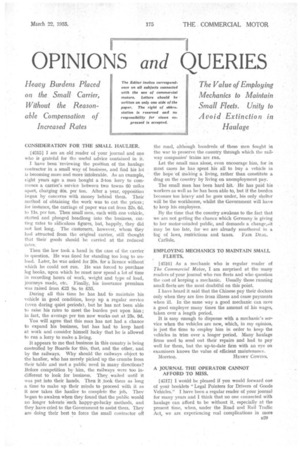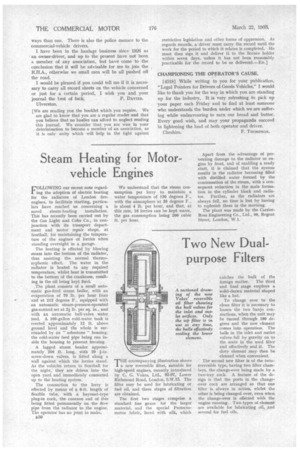OPINIONS and
Page 43

Page 44

If you've noticed an error in this article please click here to report it so we can fix it.
. [4515] I am an old reader of your journal and one who is grateful for the useful advice contained in • it.
I have been -reviewing the position of the haulage contractor in a small way of business, and find his lot is becoming more and more intolerable. As an example, eight years .ago a man bought a 3-ton lorry to cornnonce a carrier's service between two towns 60 miles apart, charging 40s. per ton. After a year, opposition began by concerns with Money • behind them. Their method of obtaining the work was to cut the prices ; for instance, the carriage of paper was cut from 32s. 6d. to Ills, per ton. Then small men, each with one vehicle, started and plunged headlong into the business, cutting rates to ridiculous figures, but, happily, they did not last long. The customers, however, whom they had attracted from the original carrier, still thought that their goods should be carried at the reduced rates.
Then the law took a hand in the case of the carrier in question. He was fined for standing too long to unload. Latex, he was asked for 30s. for a licence without which he could not run. He was forced to purchase log books, upon which he must now spend a lot of time in recording hours of work, weight and type of load, journeys made, etc. Finally, his insurance premium was raised from £23 Ss. to £35.
During all this time he has had to maintain his vehicle in good condition, keep up a regular service (even during quiet periods), but he has not been able to raise his rates to meet the burden put upon him ; in fact, the average per ton now works out at 23s. 9d.
You will agree that this man has not had a chance to expand his business, but has had to keep hard at work and consider himself lucky that he is allowed to run a lorry to make a living.
It appears to me that business in this country is being controlled by Boards for this, that, and the other, and by the railways. Why shouldthe railways object to the haulier, who has merely picked up the crumbs from their table and met a public need in many directions? Before competition by him, the railways were too indifferent to look for business. They .waited until it was put into their hands. Then it ;took them as long a time to make up their minds to proceed with it as it now takes the haulier to complete the job. They began to awaken when they found that the public would no longer tolerate such happy-go-lucky methods, and they, have cried to the Government to assist them. They are doing their best to force the small contractor off
the road, although hundreds of these men fought in the war to preserve the country through which the railway companies' trains are run.
Let the small man alone, even encourage him, for in most cases he has spent his all to buy a vehicle in the hope of making a living, rather than constitute a drag on the country by living on unemployment pay.
The small man has been bard hit. He has paid his workers as well as he has been able to, but if the burden becomes too heavy and he goes under, his only shelter will be the workhouse} whilst the Government will have to keep his employees.
By the time that the country awakens to the fact that we are not getting the chance which Germany is giving to her motor-minded public, and demands a cbange,oit may be too late, for we are already smothered in a
fog of laws, restrictions and taxes. FAIR DEAL. Carlisle.
EMPLOYING MECHANICS TO MAINTAINSMALL FLEETS.
[4516] As a mechanic who is regular reader of The Commercial Motor, I am surprised at the many readers of your journal who run fleets and who question the cost of keeping a mechanic. Usually those running small fleets are the most doubtful on this point.
I have heard it said that the Chinese pay their doctors only When they are free from illness and cease payments when ill. In the same way a good mechanic can save a good employer many times the amount of his wages, taken over a length period.
It is easy enough to dispense with a mechanic's service when the vehicles are new, which, in my opinion, is just the time to employ him in order to keep the vehicles in trim over a longer period. Many haulage firms used to send out their repairs and had to pay well for them, but the up-to-date firm with an eye on examiners knows the value of efficient maintenance.
Moreton. HENRY CowiNs.
A JOURNAL THE OPERATOR CANNOT AFFORD TO MISS.
[4517] I would be pleased if you would forward one of your booklets "Legal Pointers for Drivers of Goods Vehicles." I have been a regular reader of your journal for many years and I think that no one connected with haulage can afford to be without it, especially at the present time, when, under the Road and Rail Traffic Act, we are experiencing real complications in more ways than one. There is also the police menace to the commercial-vehicle drivers.
I have been in the haulage business since 1920 as an owner-driver, and up to the present have not been a member of any association, but have come to the conclusion that it will be advisable for me to join the 12.11,A., otherwise we small men will be all pushed off the road.
I would be pleased if you could tell me if it is necessary to carry all record sheets on the vehicle concerned or just for a certain period. I wish you and your
journal the Lest of luck. P. DAVIES. Ulverston.
[We are sending you the booklet which you require. We are glad to know that you are a regular reader and that you believe that no haulier can afford to neglect reading this journal. We consider that you are wise in your determination to become a member of an association, as it is only unity which will help in the fight against
restrictive legislation and other forms of oppression. As regards records, a driver must carry the record until the work for the period to which it relates is completed. He must then sign it and deliver it to the licence holder within seven days, unless it has not been reasonably practicable for the record to be so de]ivered.—En.j
CHAMPIONING THE OPERATOR'S CAUSE.
[4518] While writing to you for your publication, "Legal Pointers for Drivers of Goods Vehicles," I would like to thank you for the way in which you are standing up for the industry. It is very refreshing to pick up your paper each Friday and to find at least someone who understands the burden under which we are suffering while endeavouring to earn our bread and butter. Every good wish, and may your propaganda succeed in lightening the load of both operator and driver.
Cheshire. F. THOMPSON.




























































































